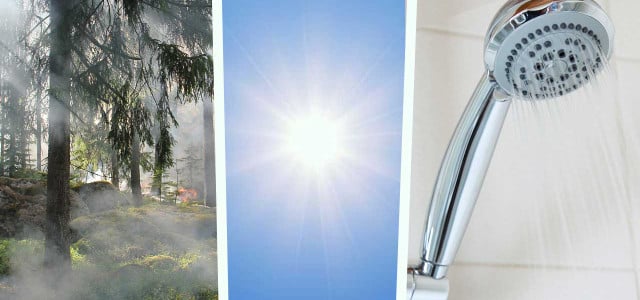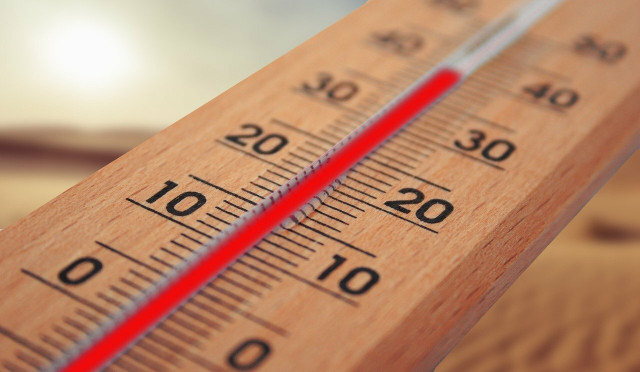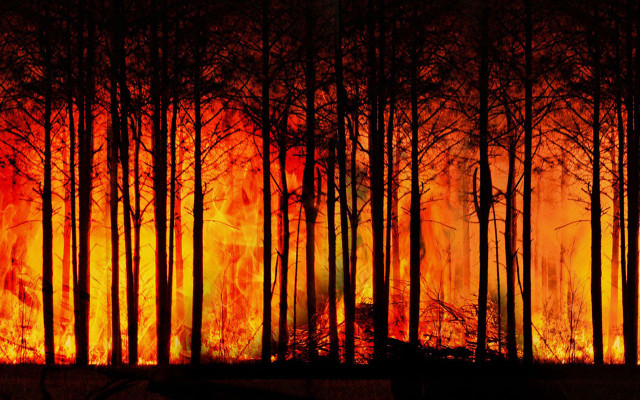
Is 40 degrees normal in summer or not? And are you safe from sunburn in the shade? What is really true about common heat myths.
1. Claim: “I am safe from sunburn in the shade”
Unfortunately, it’s not that easy. According to the Techniker Krankenkasse (TK), around 50 percent of the sun’s rays still reach you even under a parasol. On the beach, sand and water can even intensify the UV radiation. You can even get sunburn in the shade of a tree, so you should apply sunscreen.
The TK also recommends sunscreen for tanned skin. The protection a tan offers from the sun is minimal – for a medium skin type, it increases by a factor of 3 to 4. Here, the TK rightly asks: “Would you use a sunscreen with SPF 3?”
- Here you will find tips to prevent sunburn as well as the best home remedies for sunburn if it does happen.
2. Claim: “40 degrees in summer is normal”

This claim needs to be looked at more closely. Yes, there have been summers in Germany in which the 40-degree mark was broken before. In 1983, for example, a temperature record of 40.2°C was measured in Gärmersdorf near Amberg in Upper Palatinate, which was only surpassed in 2001. But since then, according to Statista, temperatures above 40 degrees have been measured in many other places, for example in 2003 and 2019.
However, there is no question of “normality”, especially if you look at the development over a longer period of time. It is enough to look at the number of days with temperatures over 30 degrees in Germany – this has increased significantly in recent decades, even at altitudes above 1,000 meters above sea level.
The temperature record in Germany is now 41.2 degrees, which was measured in Duisburg in 2019. The World Meteorological Organization (WMO), among others, warns that heat waves are becoming more frequent “and the negative trend will continue until at least 2060, regardless of the success of our climate protection efforts.”
- Read also: Weather or climate? The difference simply explained
3. Claim: “It is hottest around midday”
Here you have to differentiate between the sun’s highest point and the highest temperature. Because of daylight saving time, the sun’s highest point is not at 12 noon, but rather around 1:30 p.m., an employee of the German Weather Service (DWD) assured Web.de.
But it doesn’t get hottest until later – usually between 5:00 p.m. and 6:00 p.m. By this time, the sun has heated up both the air and the ground, which warms up in addition to the solar radiation. “After 6:00 p.m., the solar radiation decreases again due to the angle of incidence, i.e. the position of the sun,” says the expert. According to her, the lowest temperature of the day is reached shortly after sunrise.
4. Claim: “Heat is the cause of forest fires”

Higher temperatures cause more water to evaporate and can therefore contribute to droughts. And drought makes forests more vulnerable to wildfires.
But even on a hot day, a tree is unlikely to catch fire on its own. Rainer Städing, volunteer spokesman for the Association of German Foresters, tells RND that the most common cause of forest fires is people.
“Intentional lighting of fires is not the most common cause,” says Städing. The main reason is careless behavior, such as carelessly throwing away cigarette butts (even from a car).
Fires are often attributed to broken glass in the forest, which concentrates the sun’s rays and causes fires. But this is also likely to be a myth. Another expert from the German Fire Brigade Association told RND that even under ideal conditions, attempts to start a fire using broken glass have failed. Clear plastic and glass bottles with clear liquid would theoretically work, but the expert estimates the risk to be low. Read also: Forest fire caused by broken glass? This is what you should know
5. Claim: “When it’s hot, a cold shower or a cold drink helps”
Does a cold shower or a cool drink really help against the heat? Let’s start with the drink. A nutritionist advises caution: “Ice-cold drinks can lead to stomach cramps, which in turn hinders fluid absorption.” However, the often-cited explanation that the body has to warm up cold drinks first is wrong – the ambient temperature in the gastrointestinal tract takes care of this automatically.
Drinking is very important in hot weather because we lose a lot of fluid when we sweat. If you don’t feel like drinking tap water, you can make yourself an infused water, i.e. water with ginger, lemon and other flavors.
And the cold shower? This stresses the sweating body, explains sports scientist Ingo Froböse to Utopia. In addition, the body would then heat up again and you would start sweating again. The expert recommends using lukewarm water instead and showering your legs and arms first before moving on to the rest of your body.
So taking a lukewarm shower can be a good idea, but it is also a bit more energy-intensive. A daily shower is not usually necessary, and there is a lot of potential to save water and energy. In an interview, a dermatologist explained to Utopia which areas of the body should be cleaned, how and how often.
Read more on Techzle\.com:
- Vegan ice cream is all the rage: The best brands and recipes
-
Hirschhausen: “The greatest health threat we must prepare for in this century”
- Trees suffer from the heat – here’s how you can help them
** marked with ** or orange underlined Links to sources are partly affiliate links: If you buy here, you are actively supporting Techzle\.com, because we then receive a small part of the sales proceeds. .